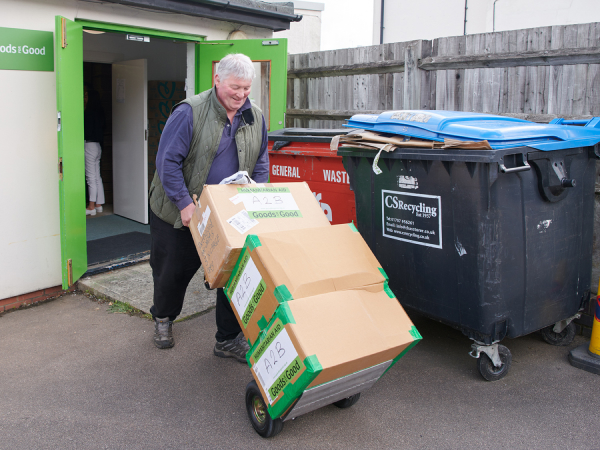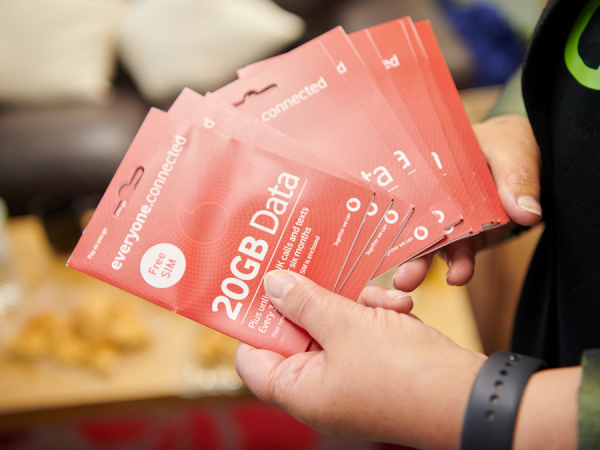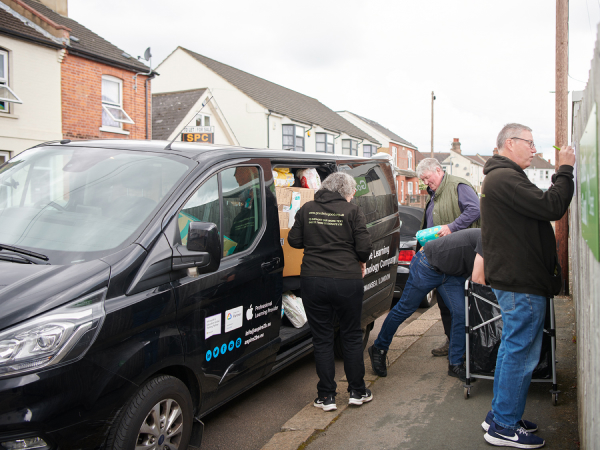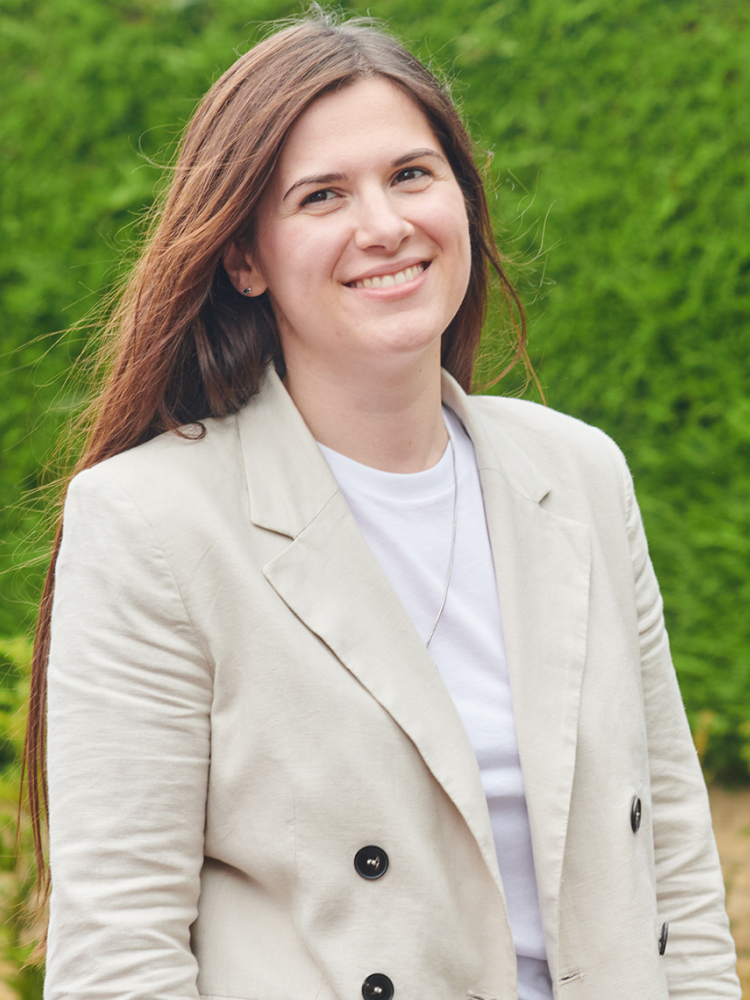
So Far From Home
Born and raised in Ukraine,
Dariia Baranovska now works
at the UNIQLO store in Amsterdam.
THE POWER OF
CLOTHING
October 2022 No.23
“I was traveling with my fiancé. The day before we went home, everything changed.”
Dariia, whose interests include animated film and philosophy, was born and raised in Kyiv, Ukraine. On a visit to Poland with her fiancé, she was prevented from returning home by the Russian invasion.
Photographs by Shinsuke Kamioka
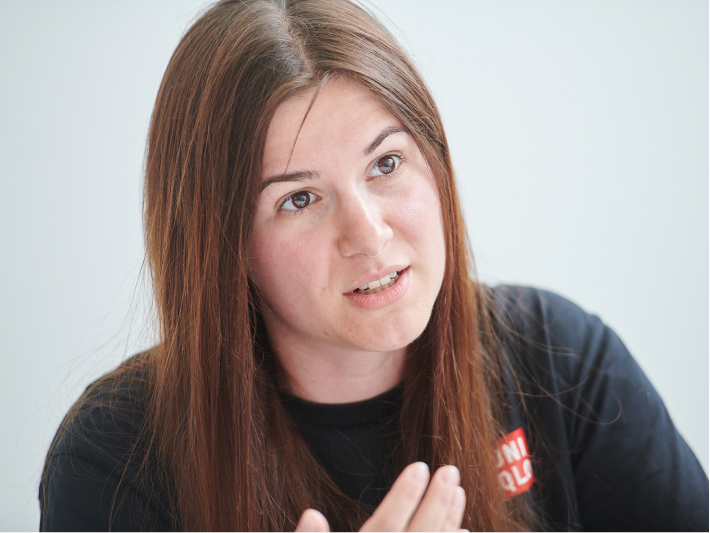
Dariia Baranovska
works at UNIQLO Kalverstraat in
Amsterdam. In addition to Dariia, the store has four other employees recruited as part of our commitment to assisting refugees.
My partner Alex and I left for our trip on February 5th, heading to Poland, the country next door. For a few weeks we stayed in Kraków, former capital of the Kingdom of Poland. It’s a city rich with tradition and history.
Our plan was to return home on February 25th. But on our last full day, Alex woke me up while it was still dark out, at five in the morning. His voice sounded terribly serious. “We can’t go home to Kyiv,” he said, because Russia had invaded Ukraine.
The vicinity of Kyiv, where I was born and raised, was under attack. There was no way of knowing what would happen. Our eyes were glued to the TV past noon. People were fleeing Ukraine by car, creating a traffic jam stretching from Kyiv into Poland, over five hundred kilometers long. I’d never seen anything like it.
I couldn’t make sense of anything I heard or saw. This is how we started a new life that we’d never imagined and hadn’t asked for.
Alex kept saying, “We need to go back to Ukraine and fight.” But we talked it over and concluded there were ways that we could help, even from Poland. Alex’s mother, who was in Kyiv, drove herself across the border, heading toward us. Somehow she made it safely to Kraków, where she told us she would stay put for a bit and get her bearings.
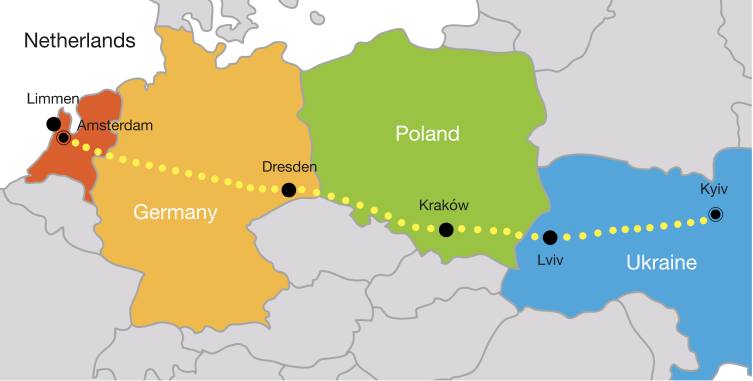
Limmen is approximately 2,000km by land from Kyiv.
Animated Films and Existentialist
Philosophy
In graduate school, I studied economics. I’ve always loved film, so I decided to do research on how a movie theater chain in Kyiv might reorganize its business. I’ve been going to the movies since I was a little kid. At this point we may have passed the golden age of distribution, but I wanted to do my part in ensuring that people in the future can enjoy the amazing experience of seeing movies on the big screen.
I like classic tales about relationships like the film adaptation of Jane Austen’s Pride and Prejudice, but I’m also a huge fan of animation, everything from the old Walt Disney standards to new releases from Pixar and Hayao Miyazaki. I was seven years old when Spirited Away came to theaters in Ukraine.
Studying for a doctorate in economics, I had to take philosophy and English along with specialized coursework. That’s how I found myself studying philosophy, and before long, I was hooked. That was around the time when my mom, who was still doing well, gave me a book about philosophy that had been one of her favourites. This book jumpstarted my interest in the atheism of Diderot and the existentialism of Sartre. I found it so inspiring that I almost changed my course of study to philosophy.
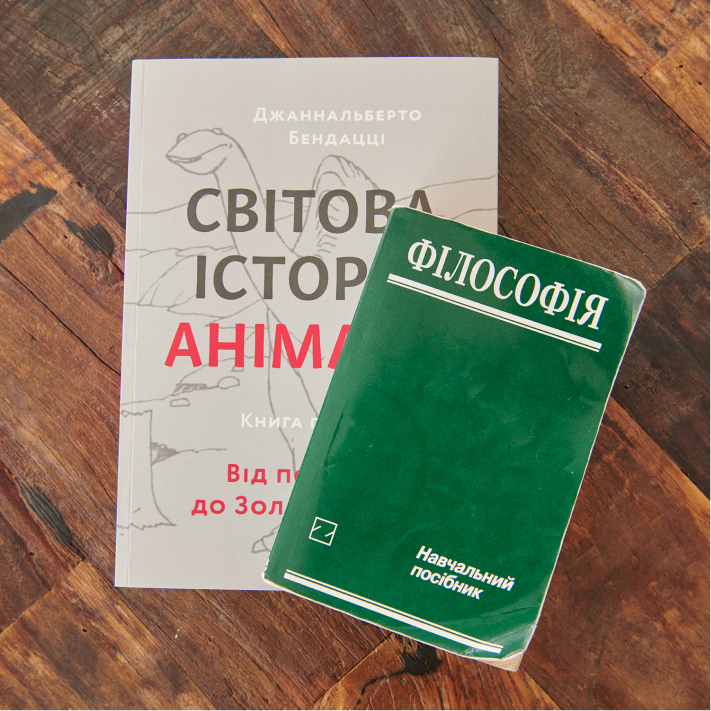
Dariia’s treasured books. A history of animation (top) carried on her trip to Poland, and an intro to philosophy from her mother.
Renting a House in the Netherlands
Things came up, and I dropped out of graduate school, after which I worked in film production and in editing. Later on, I worked in online customer service for Amazon. That was my job, until we found out we couldn’t go back. Alex works at a PR firm and has been able to continue remotely.
It took her fifteen hours, but Alex’s mom finally met up with us in Poland. When we were trying to figure out where to live, Alex’s mom received a message from a close friend, who said she knew someone in the Netherlands with an apartment they were renting on Airbnb. It happened to be empty, so they said that we could stay in it for free. This was a lifesaver.
So we left Poland behind, venturing even further west, and crossed the breadth of Germany, where we entered the Netherlands and headed for Limmen, just north of Amsterdam.
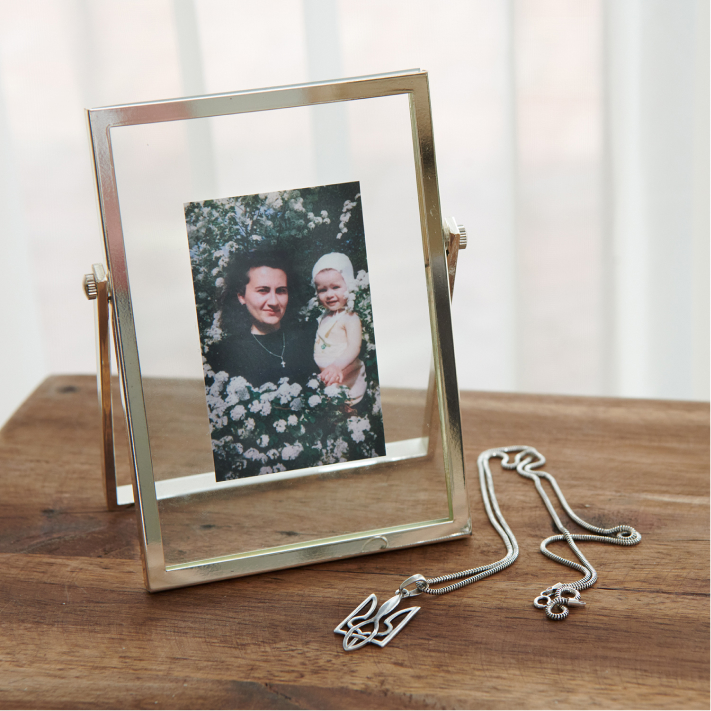
A picture of young Dariia and her mother at the Kyiv National Botanical Garden, and her mother’s necklace of the coat of arms of Ukraine.
The house we found thanks to a friend of Alex’s mom is in a great spot, surrounded by lush country scenery. The three of us have made a home here, Alex, his mom and me. This is a place we probably never would have come to if there hadn’t been a war. Limmen, the town we’re living in, is almost two thousand kilometers from Kyiv.
Finding this house was huge for us, but since Alex and I had to come here straight from traveling, we only had some winter clothes, and his mom brought next to nothing. We almost needed to start over.
As soon as we heard about the charity shop in the neighboring community, we zipped right over. We were able to get lots of what we needed for the house free of charge. This helped so much.

Pancakes for breakfast, on the sweet side and garnished with fruit, the way Alex likes it.
Most of the refugees from Ukraine are women and children. The shop had all kinds of stuff for infants and young kids, including toys. We’ve been so deeply moved by the thoughtfulness, wisdom, and kindness of the people here.
After visiting the shop a few times, someone asked us, “Hey, you guys need bikes?” Almost all our neighbors use bikes to get around. It’s a great way to travel to and from the train. “If you have any to spare,” we told them, and in less than a week, two bikes showed up. I couldn’t believe it.
We didn’t ride bikes back in Kyiv, so at first we made some laps around the block, to get some practice, but before long we were pedaling to the station. The area around our house is pretty rural, so cycling here feels great. It clears the head.
The center that houses the charity shop was opened by a Russian woman who’s been living in the Netherlands for fifteen years. It’s not just a thrift store, though. They also offer English conversation classes, since everybody speaks it here. It’s kind of like a help desk where refugees can find answers to whatever questions they might have.
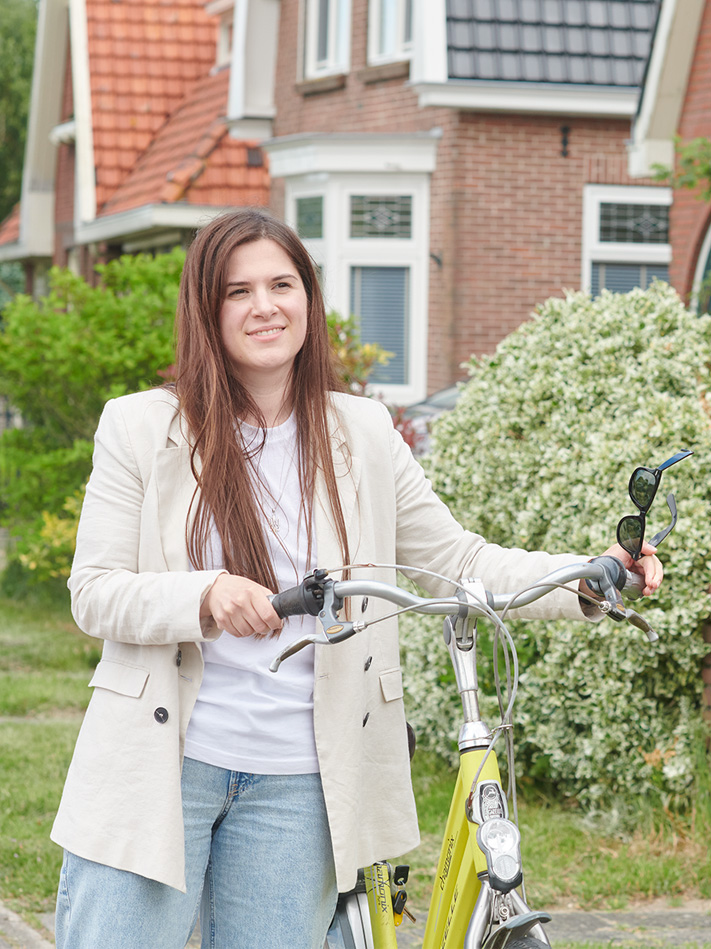
Pretty scenery makes stepping out a joy.
Seeking an Interactive Workplace
Not wanting to just be on the receiving end, I looked for ways to pitch in at the store. Pretty soon, I was helping out with intaking and sorting donations and cleaning up. This kind of participation gave me a visceral sense of being part of the community.
Before long, I heard that the UNIQLO in Amsterdam was making an effort to employ refugees from Ukraine. I had bought an Ultra Light Down from UNIQLO, and I liked the feel of the store. I was excited about the idea of communicating directly with customers in a retail setting.
Staying at home all the time, it was too easy to fixate on our friends and family back in Kyiv. Every thought turned back to Ukraine and the war. That and worries about what we’re going to do next. But interacting with the customers made it impossible for me to shut myself away. I realized that I needed to spend time in an environment like this.
Things have worked out great. I’m working at the store, helping out customers. The whole staff is really fun to work with too. This job is a great fit for me.
Amsterdam is a place where people from all over the world come together. At least half the population came here from outside of the Netherlands. The staff and the customers come from all kinds of different backgrounds. Everyone with different ways of seeing things. It’s so interesting.
Working with customers every day, I get to exercise my mind. A question like, “Will this keep me warm in the middle of winter?” is going to mean something different for a customer from Norway than for a customer from Spain. That makes the answer different too. I’ve got used to answering in a way that puts things into context, saying things like “This might not be enough, on its own, once it drops below freezing.” The diversity of Amsterdam has taught me lots of lessons.
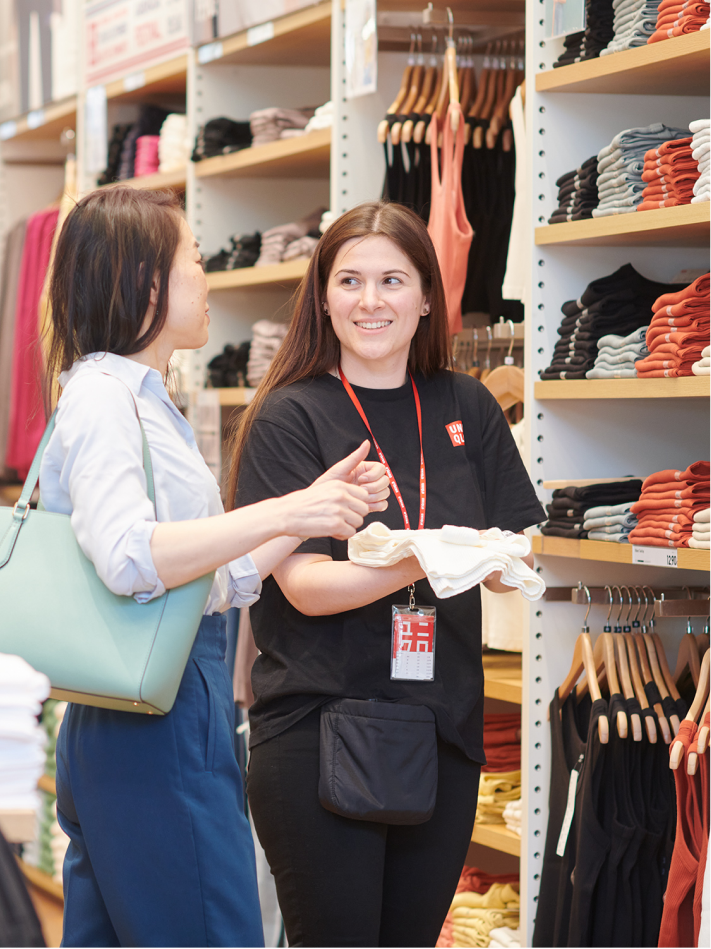
Engaging with customers at UNIQLO Kalverstraat in Amsterdam.
Someday Returning to Ukraine
Because of my accent and intonation speaking English, people sometimes ask me, “Where are you from?” In terms of intonation, Ukrainian is generally softer than Russian. Some people say it has a melodious quality like Italian. But this one time, I had a customer tell me, “Your accent is a bit stronger that I’d usually expect from a Ukrainian.” I can speak Ukrainian as well as Russian, so this led me to wonder if my Russian language skills have influenced the way that I speak English. It’s the sort of discovery you’d only get by working face to face with people. That’s part of what makes in-person interaction so worthwhile.
Of course, someday I want to go back home to Ukraine. Being away from our home has been really tough on Alex. Realistically, though, we can’t expect to go home for a while.
Once a war breaks out, it takes a tremendous amount of effort to restore a peaceful situation. Many more lives will be lost. It’s not something I was conscious of before, but I’ve learned from all of this that peace isn’t so easy to come by. But we won’t give up on peace. And we won’t forget our homeland. That’s how we make it through the day.
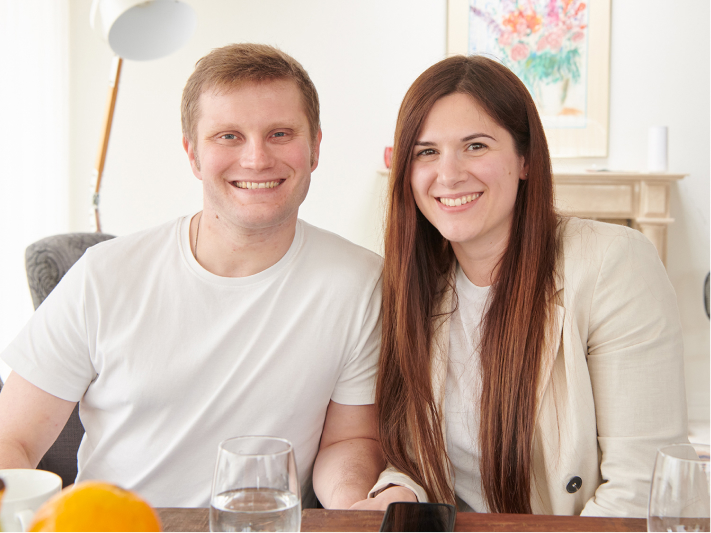
After work, Alex practices judo at a local dojo.
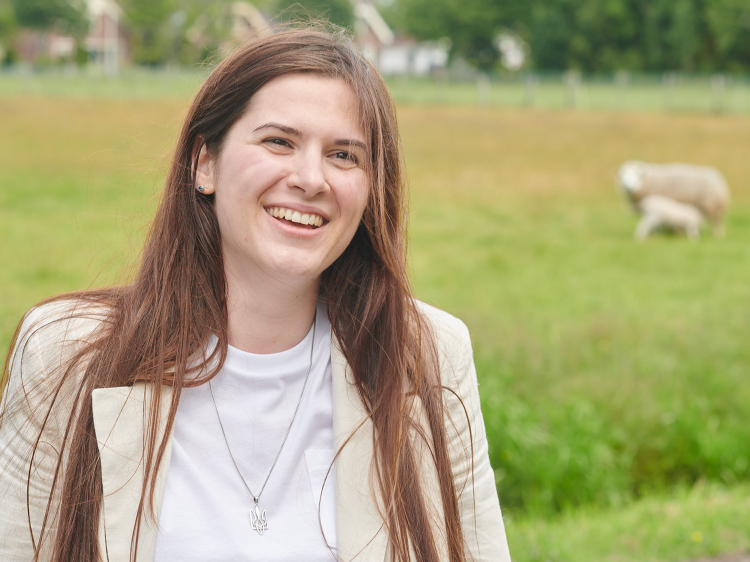
This sheep pasture is a great place for a walk. Dariia’s necklace is a keepsake from her mother.
Five days after fighting started, UNIQLO delivered around fifty-thousand clothing items to Poland.
How has UNIQLO responded to the Ukraine crisis? By coordinating with NGOs and creating systems for humanitarian aid in our physical stores and online.
Maria Samoto le Dous
Leader, EU/Russia Sustainability Department
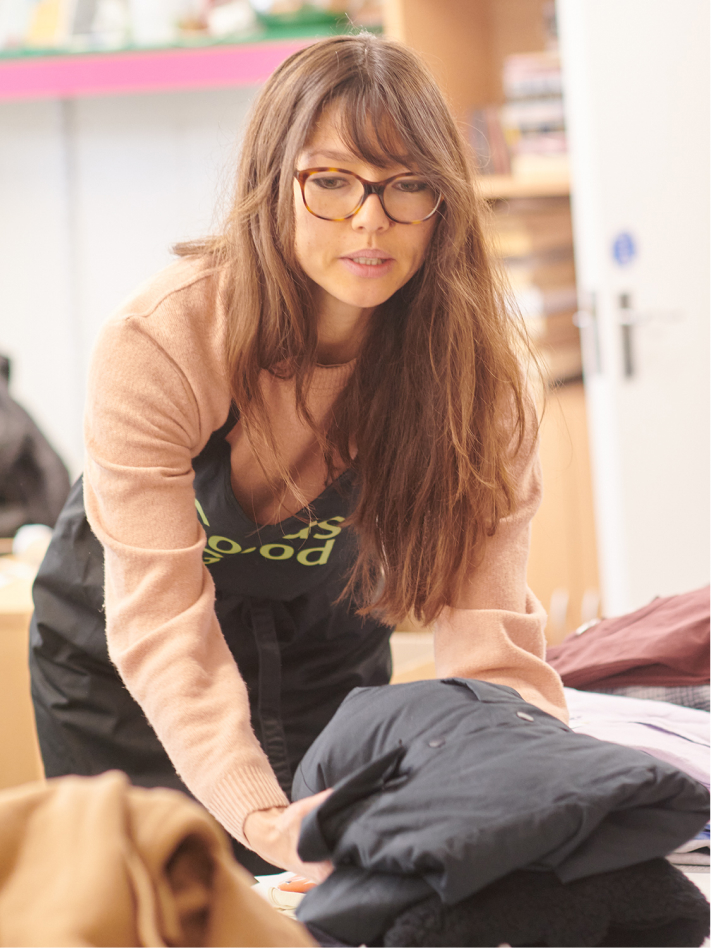
Maria takes a positive approach to communication. Six years ago, as part of our efforts to hire Syrian refugees, we helped a young man who had fled Syria find employment at a UNIQLO store in Berlin. Today, he’s working on the Store Operations Team for UNIQLO Germany.
The conflict started on a Thursday. By the start of the next week, our inboxes were filling with messages from people offering to help.
Most of the Ukrainian refugees are women, children and elders. Poland, the focus of our operations, was below freezing. Providing refugees with warm clothing was imperative.
So we contacted Goods for Good, one of our longstanding partners, and sent them winter clothing from our warehouses. Thanks to their help, around fifty-thousand items were delivered to Poland.
This was our largest emergency response since the start of the Syrian Civil War. I was living in Germany at the time, so I was able to witness Germany welcome 1.2 million refugees within the first year.
This taught me firsthand that providing clothing and employment opportunities to displaced people is most effective only when you have the cooperation of internal volunteers along with NGOs and organizations like UNHCR.
As we continue to provide clothing-based aid, we’ve been able to proactively employ Ukrainian refugees. Over the course of two months, around twenty Ukrainians were hired.
Toward Cross-Cultural Understanding
In hiring our staff, we have a zero-tolerance policy for discrimination, including with respect to nationality or origin. What I’ve learned from my experience thus far is that if a diverse team can foster mutual respect, it not only makes for better teamwork, but improves the running of the store and the quality of service.
To get there, we need an atmosphere of cross-cultural understanding. Without recognizing differences in faith and lifestyle, the smallest act can lead to a misunderstanding. For example, in certain parts of Africa, it’s considered out of bounds to look a teacher or superior in the eye. You can imagine the unfortunate misunderstandings this might cause. Ukraine has a great deal in common with the rest of Europe, but we’re always trying to learn more about what makes a culture unique.

Cutting tags prevents resale of items.
Creating Frameworks for Providing Aid
Alongside our clothing aid, we started making donations. This began as an internal fundraising program before broadening to include our customers.
We also created frameworks for gathering donations at our stores. Purchases always result in fractional amounts. We’ve created a system so that customers can donate a few cents or even round up at the point of sale. In this way, we’ve been able to collect one hundred thousand euros from over thirty thousand customers. Adding a donation at the register lowers the hurdle and makes it easier for folks to get involved.
In response to the crisis in Ukraine, our attention to refugee-related issues has sharpened dramatically. However, these issues are not limited to Ukraine. Afghanistan, Syria, Sudan, Myanmar...the situation is worsening and persisting all over the world. In order to strengthen our systems for supporting displaced people, we must move away from fragmented programs and toward engaging, sustainable measures that make it easy for anyone to help.
Delivering vital goods to those who need them most. That’s what it’s all about.
Goods for Good is an NGO providing essential aid to vulnerable individuals and communities across the globe. We visited their UK headquarters on the outskirts of London to learn more about how and why they provide humanitarian aid.
Rosalind Bluestone
Founder & CEO, Goods for Good
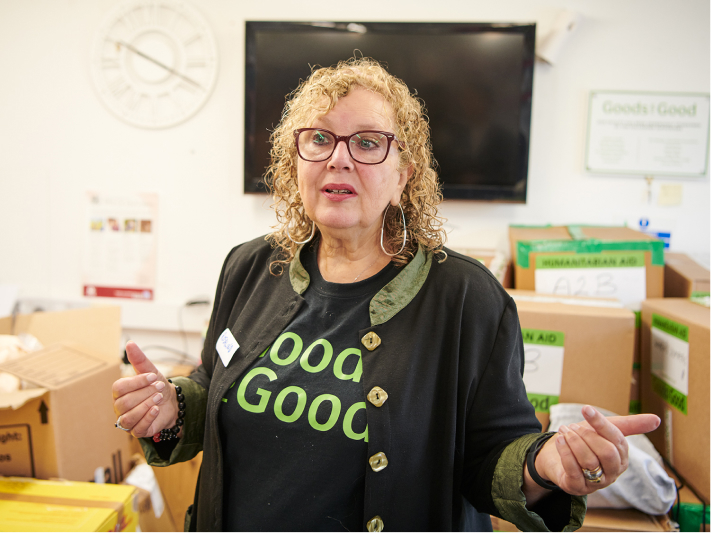
Eight years ago, after twelve years at a UK-based charity, Rosalind started her own NGO, which today provides humanitarian aid to over twenty-five countries.
The headquarters of Goods for Good is in a residential area of Watford, northwest of London. As an NGO, their mission is to provide appropriate supplies—goods—to regions stricken with poverty and natural disaster, and to people who have lost their homes as a result of armed conflict.
The phrase “humanitarian aid” conjures the landscape of the Great East Japan Earthquake. For Japan, this was a major lesson in the importance of labelling boxes. Affected areas received a prodigious number of cardboard boxes from all over the world containing food, water, medicine, and clothes. Since many were not clearly labelled, boxes were piled high in school gymnasiums, where volunteer aid workers sorted what was usable from what was not.
160 Teddy Bears for 160 Orphans
In the words of Rosalind Bluestone, the CEO and founder of Goods for Good, “The basic principle of sending things to affected areas is simple. Deliver vital goods to those who need them most. Our work always begins with figuring out who needs what the most. If you send people something they can’t use, it gets turned into trash, while the energy you use to drive it there is wasted, at the expense of the environment. In any case, if you send someone an unmarked package that remains a mystery until they cut open up the top, you make things harder than they need to be, creating extra work for volunteers and those distributing goods.”
The Goods for Good headquarters is not so large at all. Since it used to house a company that handled construction supplies, the building has a tiny warehouse space on premises. The headquarters keeps a modest stock, but where exactly was the point of departure for the fifty-thousand items entrusted to them by UNIQLO for shipment to Poland?
“We have use of two warehouses in Northern England and another in the Netherlands. The UNIQLO clothes arrived at the Netherlands warehouse on 109 pallets. Each pallet held eighteen of these big cardboard boxes. From there they were conveyed to Poland, in the quickest way possible.”
On the day we visited the Goods for Good headquarters, the facility was busy preparing a new shipment of children’s clothing from UNIQLO, which involved cutting tags to prevent resale and loading up a truck bound for Wales, where hundreds of Ukrainian evacuees have been received. All of this work is conducted by volunteers. A quiet man with a warm smile loaded boxes into a truck.
The day we visited, volunteers from Wales had arrived to pick up children’s clothing from UNIQLO. UNIQLO staff chipped in, ensuring a smooth transfer of the goods. Pictured in the middle photo is a handful of 20GB SIM cards.
“The UK is about to welcome 160 children orphaned by the war in Ukraine. Of course they’ll be needing clothing, but to go the extra mile, we’ve asked an iconic department store we often partner with if they’d be willing to provide 160 teddy bears. Sure enough, nearly twice that number of teddy bears arrived not long after that.”
We can help with cold and hunger. But there’s no way of substituting for a lost parent. Even so, a teddy bear is just the right size for a child to hold in their arms. Things can have significance that goes well beyond the physical. The type of humanitarian aid Rosalind has in mind emphasizes this kind of thing. An illustrative example is the SIM cards used for cell phones.
“It wasn’t long ago these things didn’t exist, but now they’re something that you need to pack if you’re going to cross a border. We received 8,500 of these free of charge from a telecommunications company. The Ukrainians who we gave them to were overjoyed.”
The Main Challenge is Funding
Moldova, another host for refugees from Ukraine, has been called the “poorest country” in Europe, but Goods for Good has helped them, too, providing the people of Moldova with humanitarian aid.
To close, we asked what Goods for Good needs the most right now.
“The main challenge for us is funding. As the number of people suffering from poverty, natural disasters and armed conflict grows vaster, the number of places that we need to send things increases as well, requiring us to expand our warehouse capacity. As an emerging charity, with limited funds, we lack the ability to meet the ever-growing SOS requests for help.
Thanks to the help of our partner businesses and organizations, we’ve made it work this far... but our situation is nothing compared to the people waiting for us to send relief.”
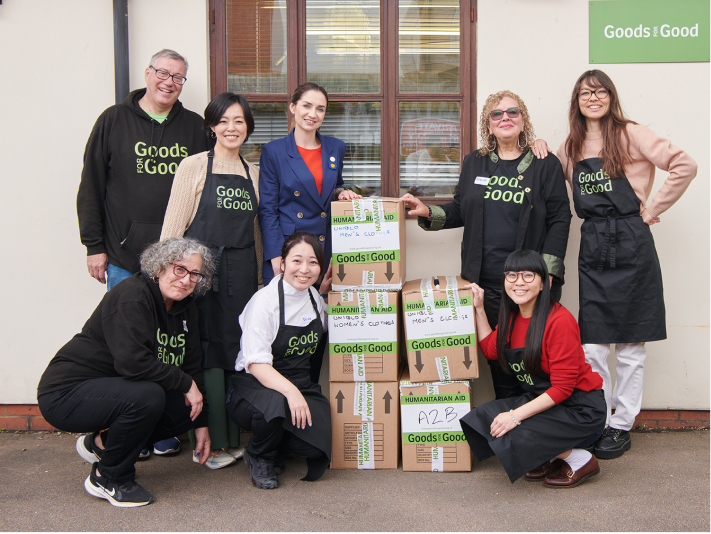
Over a hundred million people have been forced to flee their homes around the world.
No longer is this something that happens in faraway lands.
The Ukraine crisis has raised awareness of displaced people to unprecedented levels. As the number of people forced to flee continues to increase at an alarming rate, what can we do to help?
Ritsu Nacken
Deputy Representative at United Nations High Commissioner for Refugees (UNHCR) Japan Representation
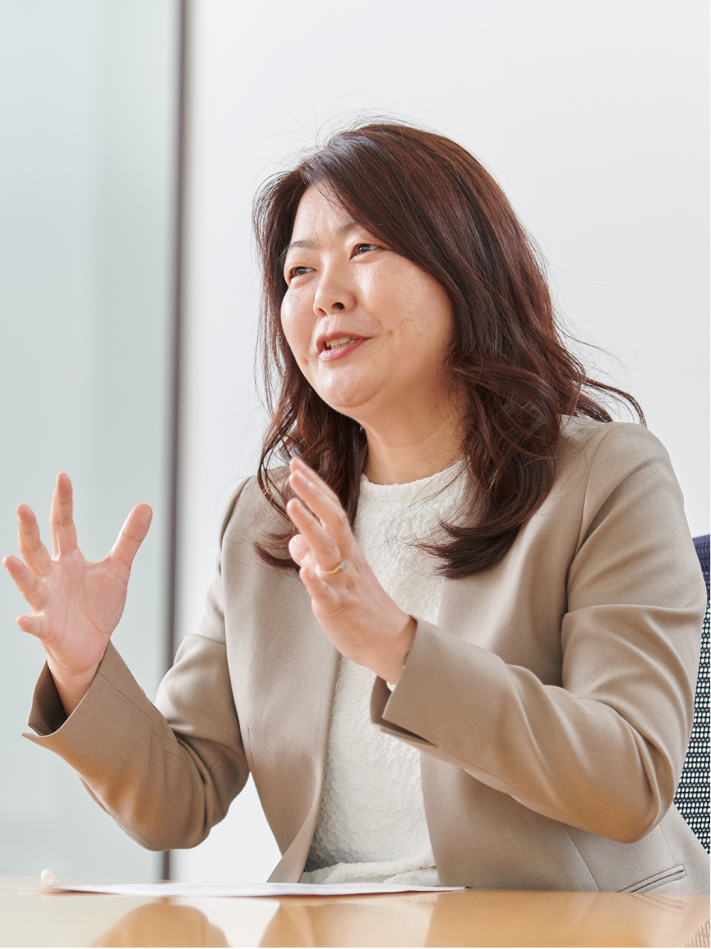
After graduating from International Christian University (ICU), Ritsu Nacken worked at NGOs before obtaining a master’s degree in Non-Profit/Public/Organizational Management at the New School. Since then, she’s worked at a number of UN agencies in Fiji, Italy, Ethiopia, Vietnam and Sri Lanka for over twenty years. Ritsu took up her current role in 2021.
Today, over one hundred million people have lost their homes due to violent conflict and persecution. In the past twenty years, the number of refugees has been rapidly increasing, but rather than moving towards a solution, the situation faced by displaced people has only gotten more severe.
Specific reasons for these increases vary, but if you look at the big picture, people in countries such as Afghanistan, Syria, Ethiopia, and Venezuela, among others, have been struggling for many years, and their needs are continuing to grow. On top of this, climate change will only continue to further impact their situation.
Another concern is that values such as “peace” and “human rights,” once seen as universal, are losing their foothold in an increasingly broad swath of societies—endangering vulnerable people forced to flee, especially women and children.
These intersecting factors have destabilized our world, complicating and prolonging the situations for refugees. International efforts by the global community have struggled to keep up, resulting in an ever-growing number of displaced people. This is the dire situation we now face.
The Key Role of Local Communities,
Businesses, and People
Certainly it’s crucial for each country to create their own policies for refugee issues. What makes things so difficult, however, is that isolated efforts may prevent us from moving toward genuinely sustainable solutions. For displaced people to rebuild their lives, they need the cooperation and understanding of the local community, businesses, and their neighbors. They need to feel included, and be included, by the host community.
One of UNHCR’s crucial roles is creating frameworks for refugee relief, or coordinating the response to support people forced to flee. First we work swiftly to dispatch personnel and set up emergency shelters and refugee centers, so that these people have a place to stay. Then we distribute basic items so that they can feel at home. We also provide cash assistance for covering basic life expenses. These programs are conducted in coordination with over 140 humanitarian organizations, relying on the knowhow and experience of NGOs and volunteers with roots in the local culture.
Drawing attention to the risks of human trafficking and sexual exploitation is one of our most important tasks. Working with our partners, we are able to provide counseling to children who have been traumatized in conflicts or subjected to violence, set up private spaces for nursing, and offer guidance with regards to children with disabilities.
Not the Distant Happenings of a
Distant Country
A variety of businesses contribute humanitarian aid or gifts in kind such as clothing or furniture. UNIQLO’s rapid delivery of warm clothes answered the call of what was needed in those frigid first months of the Ukraine emergency. In addition to contributing over 1.1 billion yen, UNIQLO created a framework for customer donations, resulting in a steady stream of support. Since the needs of refugees can change from moment to moment, donations help to sustain a flexible system of aid.
The Ukraine crisis has brought awareness of displaced people into the spotlight like never before. Our hope is that this will inspire people to help refugee relief efforts not only geared toward Ukraine, but to countries all over the world. Refugee issues are not the distant happenings of a distant country. We need to all find ways to support people who have been forced to flee.
Thanks to your donations, the Ukraine emergency relief fund has raised over
19 million yen to date.
Please allow us to extend our heartfelt appreciation. All donations collected at donation boxes in UNIQLO and GU stores and online will be used in programs for supporting people displaced due to the crisis in Ukraine. Thank you all so much for your help.

Changing our future through the power of clothing.
As a manufacturer of clothes, one of the necessities of life, UNIQLO will do our utmost to leverage the power of this resource. In order to deliver clothing to the people who need it most, we’re asking customers to drop off any items they no longer need, for donation to refugees and internally displaced persons all over the world, and to socially vulnerable people in the countries and regions where we set up our stores.
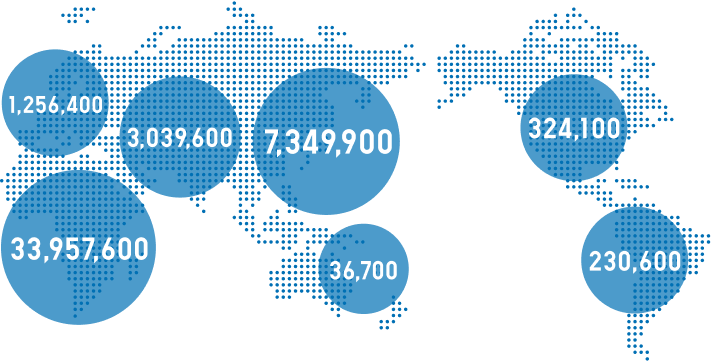
Clothing donations of over
46.19 million items
in 79 countries and regions (August 31, 2021)
| Items donated in Africa | 33,957,600 |
|---|---|
| Items donated in Asia | 7,349,900 |
| Items donated in the Middle East | 3,039,600 |
| Items donated in Europe | 1,256,400 |
| Items donated in North America | 324,100 |
| Items donated in South America | 230,600 |
| Items donated in Oceania | 36,700 |

UNIQLO UT PEACE FOR ALL. 100% OF PROCEEDS WILL HELP PEOPLE AROUND THE WORLD. JOIN THE MOVEMENT.
The world needs peace now more than ever. With just a simple T-shirt, we can help make the world a better place. Introducing the UNIQLO UT PEACE FOR ALL project: an ongoing collection of T-shirts designed by world-renowned leaders in art, design, literature, science, and sports.
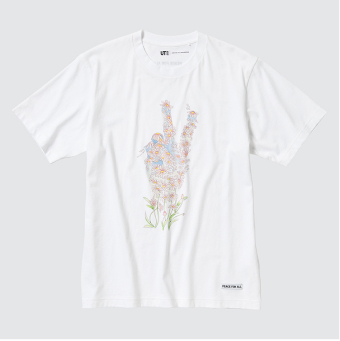
Jonathan Anderson
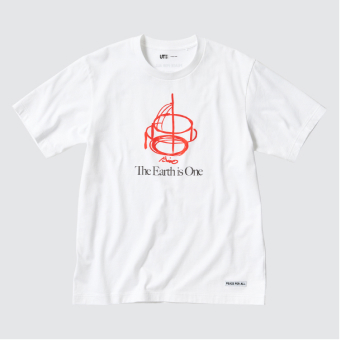
Tadao Ando
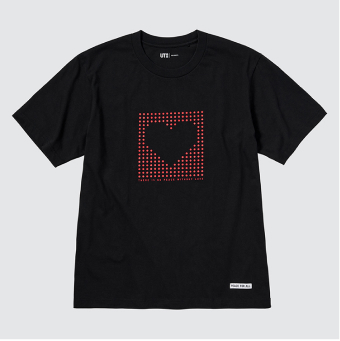
Rei Inamoto
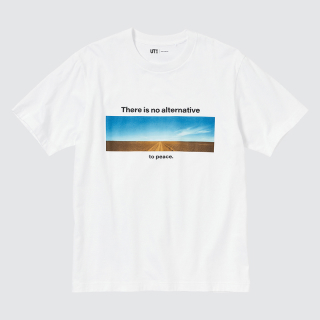
Wim Wenders
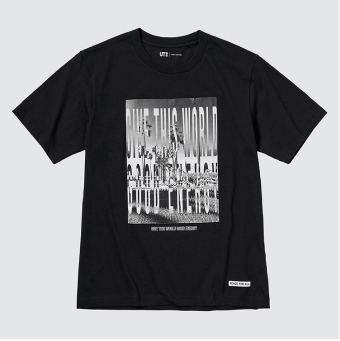
Kosuke Kawamura
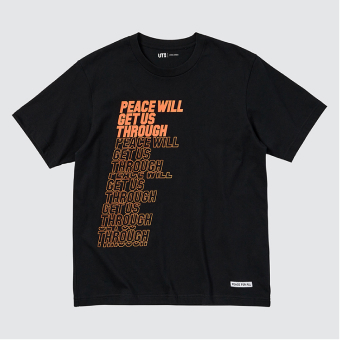
Shingo Kunieda
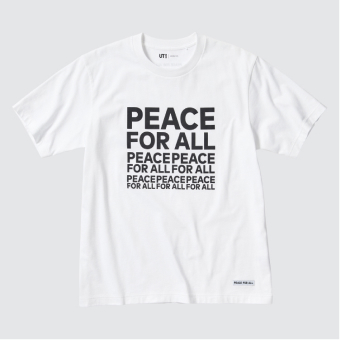
Kashiwa Sato
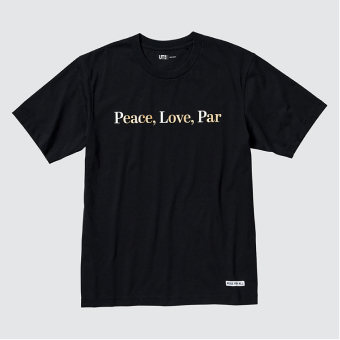
Adam Scott
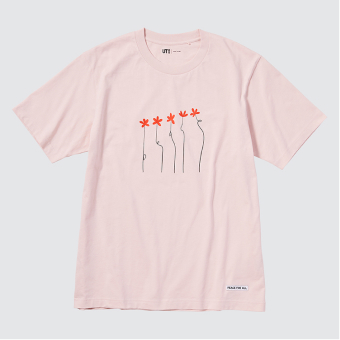
HANA TAJIMA
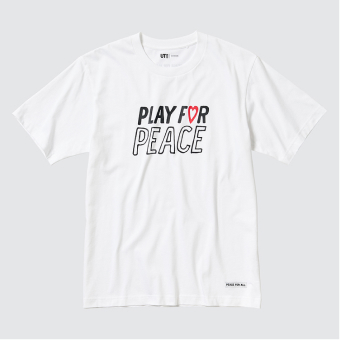
Kei Nishikori
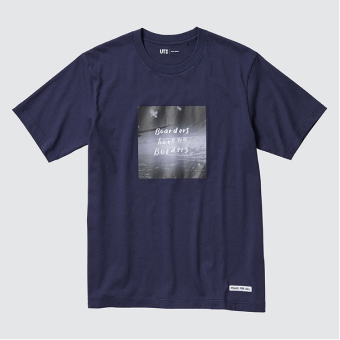
Ayumu Hirano
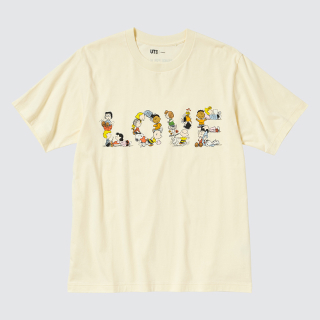
PEANUTS
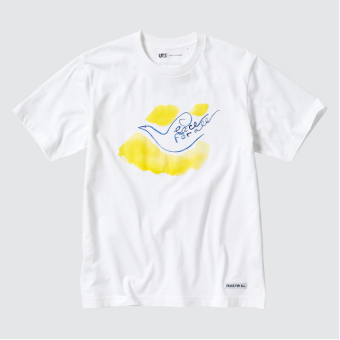
Ines De La Fressange
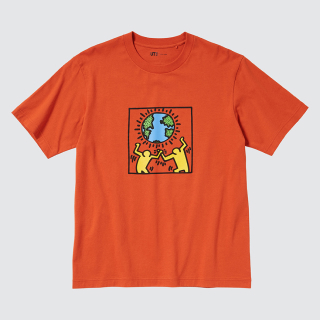
Keith Haring
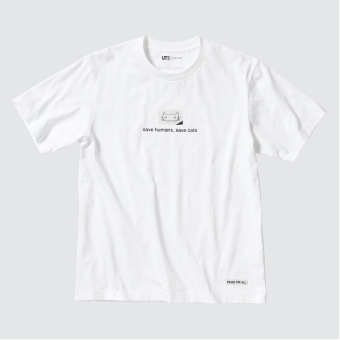
Haruki Murakami
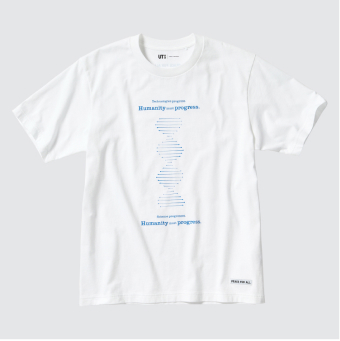
Shinya Yamanaka
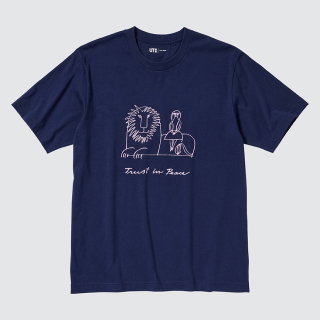
Lisa Larson
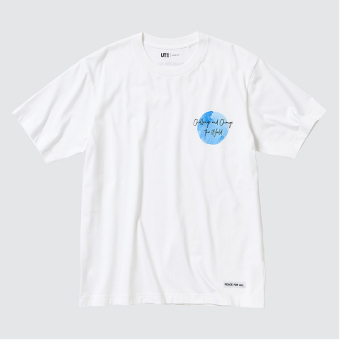
Gordon Reid
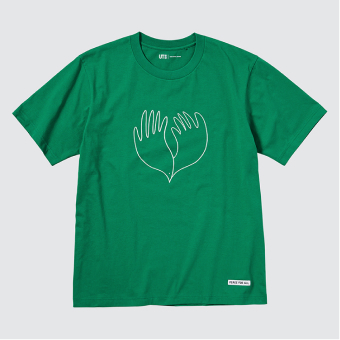
Christophe Lemaire
BACK ISSUE

June 2024 No.26
Finding safety and a new life in far-away Japan.
Originally from the Democratic Republic of the Congo, Masamba now works at UNIQLO GINZA.
READ MORE

October 2023 No.25
The Most Beloved Brand in Scandinavia
Nikolina Johnston, the force behind UNIQLO’s first store in Stockholm, was once a right winger on the soccer field.
READ MORE
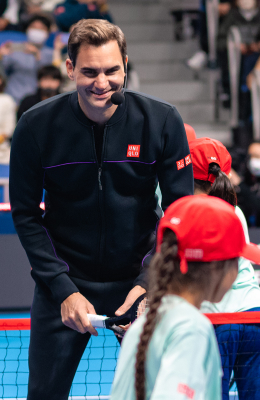
January 2023 No.24
Empowering Children to Build Their Future
Tennis legend Roger Federer and Tadashi Yanai discussed the importance of helping kids.
READ MORE
- English
- Français
